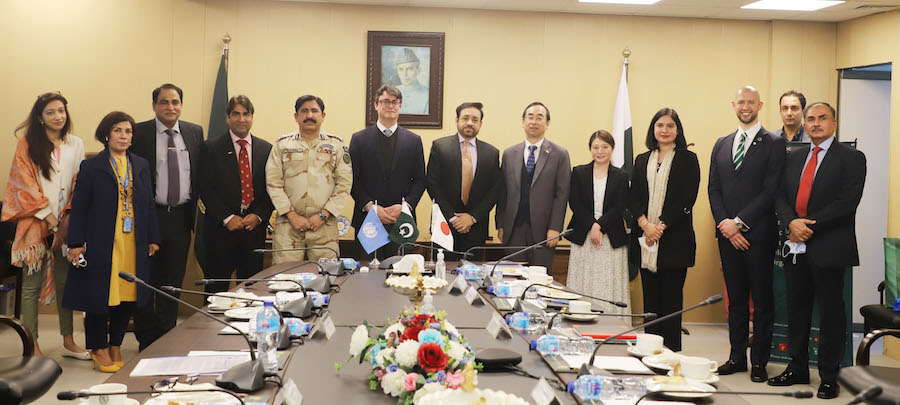Anti Narcotics Force (ANF) receives prefabricated buildings and body scanners
Prefabricated buildings and body scanners have been provided to Pakistan’s Anti Narcotics Force (ANF) in the Khyber Pakhtunkhwa (KP) province under a UNODC project funded by the Government of Japan. These facilities were already operational at the Multan, Sialkot, and Faisalabad International Airports.
The joint inauguration ceremony was held on February 9 at the Ministry of Narcotics Control, Government of Pakistan, in coordination with the United Nations Office on Drugs and Crime (UNODC) under the Japan-funded Border Security Project.
Dr. Syed Kaleem Imam, Federal Secretary of Ministry of Narcotics Control, offered his gratitude to the Government of Japan for its continuous official development assistance in Pakistan, as an old-time friend and a strategic partner in the Asia-Pacific region.
The inauguration ceremony was attended by HE Mitsuhiro Wada, Ambassador Extraordinary and Plenipotentiary to Pakistan, Dr. Syed Kaleem Imam, Federal Secretary Ministry of Narcotics Control, Dr. Jeremy Milsom, Representative of UNODC Country Office Pakistan (COPAK) and senior officials from the Ministry of Narcotics Control, ANF, the Embassy of Japan, and UNODC COPAK.
Welcoming the delegates, Dr. Milsom thanked Federal Secretary Imam and Ambassador Wada for their presence at the gracious occasion and their understanding in conducting this important event at the Ministry following strict SOPs, due to the prevailing COVID situation in the country.
He also recognized ANF’s whole-hearted counter-narcotics operations efforts and reiterated his utmost respect for all the ANF personnel who had laid down their precious lives in the fight against drugs and illicit crime in various parts of the country.
Dr. Milsom reiterated that “UNODC well recognizes ANF’s leading counter-narcotics role, and it will always remain our crucial partner in Pakistan. We also believe that multi-dimensional roles and cross-cutting mandates of various national stakeholders can be used as a force-multiplier, to address risks and challenges of drug trafficking in Pakistan”.
Saqib Khan, Program Officer (Border Management) of UNODC COPAK highlighted the specificity of the ANF prefabricated facilities and the three body-scanner, which have already been operationalized by the ANF.
Dr. Syed Kaleem Imam, Federal Secretary Ministry of Narcotics Control, thanked the Embassy of Japan and UNODC COPAK for successfully implementing the capacity-building activities under the 5-year project that commenced in April 2016. He also highlighted the emerging misuse of the internet for drug peddling and money laundering, a predicate crime and a growing challenge for the rule of law and socio-economic development.
“We highly appreciate the continuing capacity-building interventions by UNODC – our closest strategic partner in the UN family. The ANF continues its leading counter-narcotics efforts not only in Pakistan, but we have also facilitated drug interdiction operations together with our international partners, through sharing of timely and accurate information. Following the drastic political changes in Afghanistan and its impact on the wider region, the Government of Pakistan continues its efforts to strengthen peace and socio-economic stability in Afghanistan. While remaining cognizant of the impact of this situation in terms of drug production and trafficking from Afghanistan, the ANF has executed several drug interdiction operations to nab Drug Trafficking Organizations (DTOs) existing in our region, that continue attempts to exploit Pakistan’s geographical location next to Afghanistan and the shortest distance it provides to the international maritime routes”, stated Dr. Kaleem Imam.

Mitsuhiro Wada, Ambassador Extraordinary and Plenipotentiary to Pakistan, highly appreciated the substantial efforts provided by UNODC, the Ministry of Narcotics Control, and the ANF in this project funded by Japan. “We understand that these contributions have greatly assisted the Government of Pakistan in its path to achieving a drug-free state. Ensuring stability and peace are central to realizing sustainable development in Pakistan, and we are honored to be part of this great journey. We truly appreciate the dedication demonstrated by the ANF and other border law enforcement agencies in the line of duty, to combat illicit drug trafficking and associated money laundering more effectively”, expressed Ambassador Wada.
The ANF’s concerted counter-narcotics efforts had resulted in record-high drug seizures during 2020 and have had a wider impact beyond Pakistan’s borders. These efforts have been supported through capacity-building implemented by the UNODC, with the aim of creating a safe community free from the menace of drug trafficking and related transnational organized crime. In the current geopolitical situation in Afghanistan, there remains a need for continuous capacity-building support, to address the emerging trends and challenges more effectively, such as the Afghan-origin opiates, New Psychotropic Substances (NPS), and synthetic drugs flowing into Pakistan. It could help in further stabilizing peace and socio-economic development in Pakistan and the wider region.

